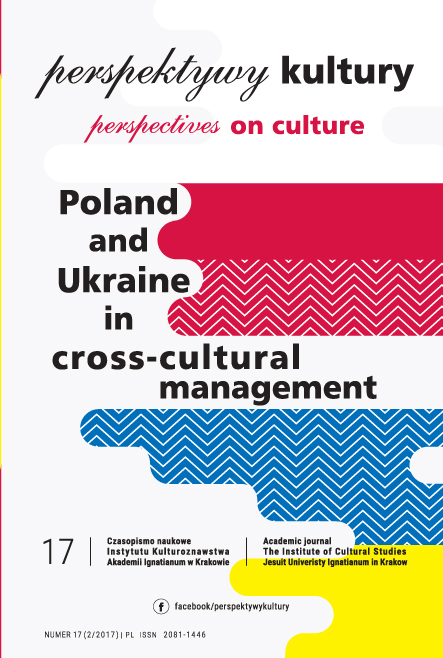Similarities and Cultural Differences as a Basis for the Development of Mutually Beneficial Relations Between Poland and Ukraine
Abstract
Ukraine and Poland are the neighbor countries, the proximity of which is not only a geographical location, but also similarities in the historical development of the last century, today’s political direction. The cultural affinity of the two nations is particular important as the basis for the establishment of strong, mutually beneficial relationships between entities and citizens of the two states. The authors have con- ducted a comparative analysis of cultures of Poland and Ukraine. The study found that the Ukrainian and Polish have similar cultural val- ues. Both countries have middle level of power distance and slight- ly elevated level of the desire to avoid uncertainty. Representatives of both nations prefer collectivist principles and moderate feminism and follow middle-context communication style. Despite the overall sim- ilarity, some difference in the behavioral culture of the two nations was marked. Thus, in Poland the uneducated persons have revealed the highest level of power distance while the same social stratum in Ukraine have demonstrated the lowest level of this indicator. Young Ukrainian behave in more individualistic way compared to older peo- ple, while in Poland, by contrast, the trend from individualism (of the older generation) to collectivism (of young) is developed.
References
HOFSTEDE Geert, HOFSTEDE Gert Jan, MINKOV Michael. 2010. Cultures and organizations: software of the mind: intercultural cooperation and its importance for survival. New York: McGraw-Hill.
MEAD Richard, ANDREWS Tim G., 2009. International management: cul- ture and beyond. Chichester: John Wiley & Sons Ltd.
АЛДОШИНА Марія, БРУСІЛЬЦЕВА Ганна. 2014. „Крос-культурні комунікації в галузі туризму в умовах глобалізації”. Бізнес Інформ 3: 197-202. [Zasób elektroniczny] – access: 16.04.2017. http://nbuv.gov.ua/UJRN/ binf_2014_3_32
БЛИЗНЮК Тетяна. 2011. „Крос-культурні особливості комунікацій в Україні”. Економіка розвитку 1/57: 72-74.
ДЮМЕТЦ Жером, СОСНОВСЬКА Ганна. 2013. „Кросс-культурная коммуникация”. Управленческое консультирование 8: 83-90.
МЕШКО Наталля, БУЛАНКІНА Ольга. 2012. „Крос-культурний менеджмент у корпоративних стратегіях міжнародних компаній”. Ефективна економіка 7. Access: 16.04.2017. http://www.economy.nayka. com.ua/?op=1&z=1274
Офіційний сайт Посольства України в Республіці Польща [Zasób elektroniczny] – access: 16.04.2017. http://poland.mfa.gov.ua/ua/ ukraine-pl/culture
Офіційний сайт Міністерства іноземних справ Республіки Польща Access: 16.04.2017. http://www.msz.gov.pl/en/p/msz_en/foreign_policy/ eastern_policy/ukraine;jsessionid=B0E62FBE9502AEAD2428AA097F82EC3C. cmsap1p
ПАН Лілія, РОМАНЧЕНКО Наталля, Вплив культури на рівень еко- номічної свободи і міжнародну комерційну діяльність, Наукові записки НаУКМА, 2008, т. 81: Економічні науки, с. 61-66.
ПЕТРУШЕНКО Юрій. 2009. „Вплив дистанції культур на розвиток міжнародних економічних відносин”. Экономическая теория 2: 85-95. Access: 16.04.2017. http://dspace.uabs.edu.ua/jspui/handle/123456789/12467
СТЕГНІЙ Олександр. 2013. „Методологічні складності крос-культурних досліджень”. Українській соціум 2/45: 99-111.
ШУЛЬГА Володимир, СІКОРСЬКА Ірина. 2014. „Особливості ієрархії цінностей польських та українських студентів”. Вища освіта України 2: 94-101.
Copyright (c) 2017 Jesuit University Ignatianum in Krakow

This work is licensed under a Creative Commons Attribution-NoDerivatives 4.0 International License.
Autor, zgłaszając swój artykuł, wyraża zgodę na korzystanie przez Wydawnictwo Uniwersystet Ignatianum z utworu na następujących polach eksploatacji:
- utrwalania utworu w formie papierowej, a także na nośniku cyfrowym lub magnetycznym;
- zwielokrotnienia utworu dowolną techniką, bez ograniczenia ilości wydań i liczby egzemplarzy;
- rozpowszechniania utworu i jego zwielokrotnionych egzemplarzy na jakimkolwiek nośniku, w tym wprowadzenia do obrotu, sprzedaży, użyczenia, najmu;
- wprowadzenia utworu do pamięci komputera;
- rozpowszechniania utworu w sieciach informatycznych, w tym w sieci Internet;
- publicznego wykonania, wystawienia, wyświetlenia, odtworzenia oraz nadawania i reemitowania, a także publicznego udostępniania utworu w taki sposób, aby każdy mógł mieć do niego dostęp w miejscu i czasie przez siebie wybranym.
Wydawca zobowiązuje się szanować osobiste prawa autorskie do utworu.





